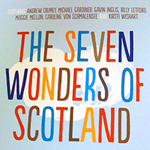The talented Lynsey May kindly asked me last week if I wanted to pick up the baton and share my Next Big Thing. Over the last few weeks, writers have written about what they’re doing next and asking other writers to do the same. The resulting blog posts make for inspiring reading! I couldn’t turn down a chance to brag a little, so here goes.
1. What’s the title of your latest story?
Salanntùr. It’s one of seven stories in a collection called The Seven Wonders of Scotland.
2. Where did the idea for the story come from?
Birlinn put out a call for submission for an anthology of stories about imaginary Scottish wonders that said something about Scotland as she is today, or what she might be tomorrow. I’d been reading an article about an idea for slowing global warming: kilometer-high salination towers floating around the Faroes. It was in part based on research done at the University of Edinburgh. I though “what if that worked? What if we’d been working towards that solution for decades – how would that affect Scotland, and what could it mean for the world?”
3. What genre does your story fall under?
Literary fiction.
4. What actors would you choose to play the part of your characters in a movie?
The main two characters are Janet, a journalist from Glasgow, and Arthur, a not so nutty professor. In my mind, Janet looks something like Fiona Bruce but she’s not an actress. Hm. Let’s pick Kelly Macdonald for that role, though she’s a little too young. Arthur is tall, tweed-clad, and ageing gracefully in the salty air of northern Scotland. I need someone distinguished who can make us believe him when he flips from warm to cold. John Hurt would be perfect.


See? Don’t they look great? Now imagine them wind-swept and covered in salt. (Images from Wikipedia.)
5. What is the one sentence synopsis of your story?
It’s Scotland’s greatest gift to the world – a kilometre high tower that will float around the world’s oceans to spray a thin mist of salt water into the air, reflecting sunlight out towards space, cooling the earth – but it is a controversial gift because of how the building of it affects the local environment.
 6. Will your story be self-published or represented by an agency?
6. Will your story be self-published or represented by an agency?
Neither. Salanntùr is part of an anthology, The Seven Wonders of Scotland, and launches at Blackwell’s Bookshop, in Edinburgh, 18:30 on November 27th. Come along! Kirsti Wishart, Gavin Inglis and I will read from our stories. Gerry Hassan, the editor, will be there too.
7. How long did it take you to write the first draft?
I should know that to the minute, but I don’t. I wrote the first draft in stages to get it in to review with my writer’s group. The first version they saw took maybe four hours to put together and was a magazine article and a long list of bullet points. (The one that said “Epiphany here” got a good laugh.) I think I spent another six or eight hours filling in the gaps before I had something that can be called a first draft. It was way too long so I spent some time whipping it into shape.
8. What other stories would you compare it to within your genre?
The format – split between the first-person article that the journalist writes after her visit to Sallantùr and a third-person account of her experiences there – feels well established but I can’t think of a particular story that I’ve read that uses it. Books often use that structure but then the introductions are proportionally shorter.
9. Who or what inspired you to write this story?
My friend Helen Jackson told me about Birlinn’s call – I wouldn’t have know anything about it if she hadn’t mentioned it. Then I played with different ideas. The salt spraying tower came to me quite quickly, but in its first incarnation, it was a bone-white, 150 meters tall, 2,000 year-old salt-spraying tower that rose from the middle of Loch Ness. Imagine that long valley, dusted in salt, sparkling dully in the sunshine: black water, white, white ground and a spire, straining towards the sky. It was a nice image, but rather too baroque for what I was trying to say.
10. What else about your story might pique a reader’s interest?
It has everything you might want in a story: strong characters, evocative environments and science. I’d like to visit Salanntùr, it’s an intersting place. It’s a pity it’s fictional.
Now, I’m passing the Next Big Thing baton on to Gavin Mcmenemy. Gavin’s was my first writer’s group (it was a small group) and writes great stories, often, but not always, with in the sci-fi genre. He has a story in the Diamond Light Source short story anthology Light Reading. The cover art is, in fact, an illustration for his story. So, what’s next? Take it away Gavin!


